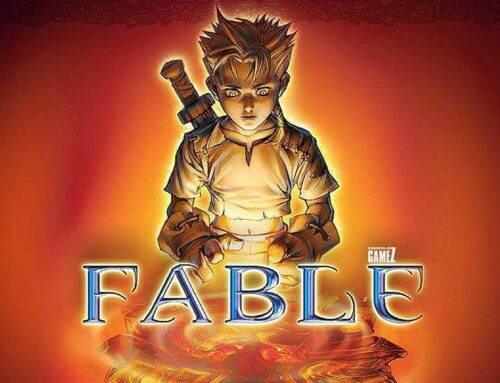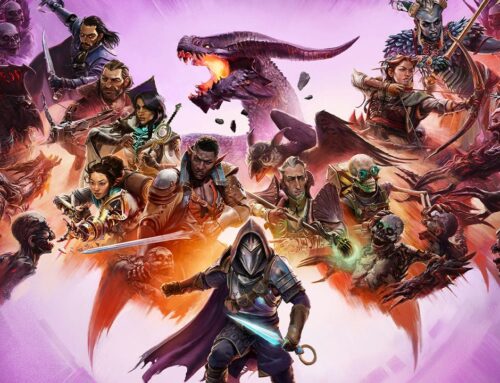Ever wanted to play as a sorcerer in Russia-occupied Poland at the beginning of the 20th century? If so, then The Thaumaturge, an RPG developed by Fool’s Theory, is the game you’ve been looking for.
In all seriousness though, The Thaumaturge is more than likely not to be your cup of tea. Aside from its obscure – albeit fascinating setting – this isn’t your standard isometric RPG. For one, its focus is on storytelling and dialogue choices, not combat – similarly to Disco Elysium. Secondly, while it does feature combat, it’s somewhat shallow, and often, easy too. You can investigate things, but those investigations are very surface level.
The Thaumaturge’s biggest problem is that it tries to do too many things at once, instead of focusing on one thing, the way, for instance, Disco Elysium does – which foregoes combat scenarios in favour of its setting and story.
Still, there is a lot to like about The Thaumaturge, and it’s clear that a lot of love had gone into this game, even if it doesn’t succeed as much as it could.
Gameplay
As the title implies, you are a thaumaturge – sorcerer (of sorts) who can read objects to determine the intentions of others, in addition to manipulating people using creatures known as “salutors.”
The protagonist isn’t a character you create. His name is Wictor Szulski (pronounced with a “V”), and he has his own preset backstory and relationships, which you can’t alter at the beginning. As the game goes on, however, you get to shape his abilities, skills and relationships with others – especially with Ligia, his twin sister, and Rasputin (yes, that Rasputin), his mysterious mentor. In this way, Wictor is similar to Geralt of Rivia from The Witcher games, in that aspects of his personality are set in stone, but you can still nudge him in different directions throughout the story. He is not the blank slate in the same way the protagonist of Disco Elysium is, who can be molded into just about anyone by the end of that game.
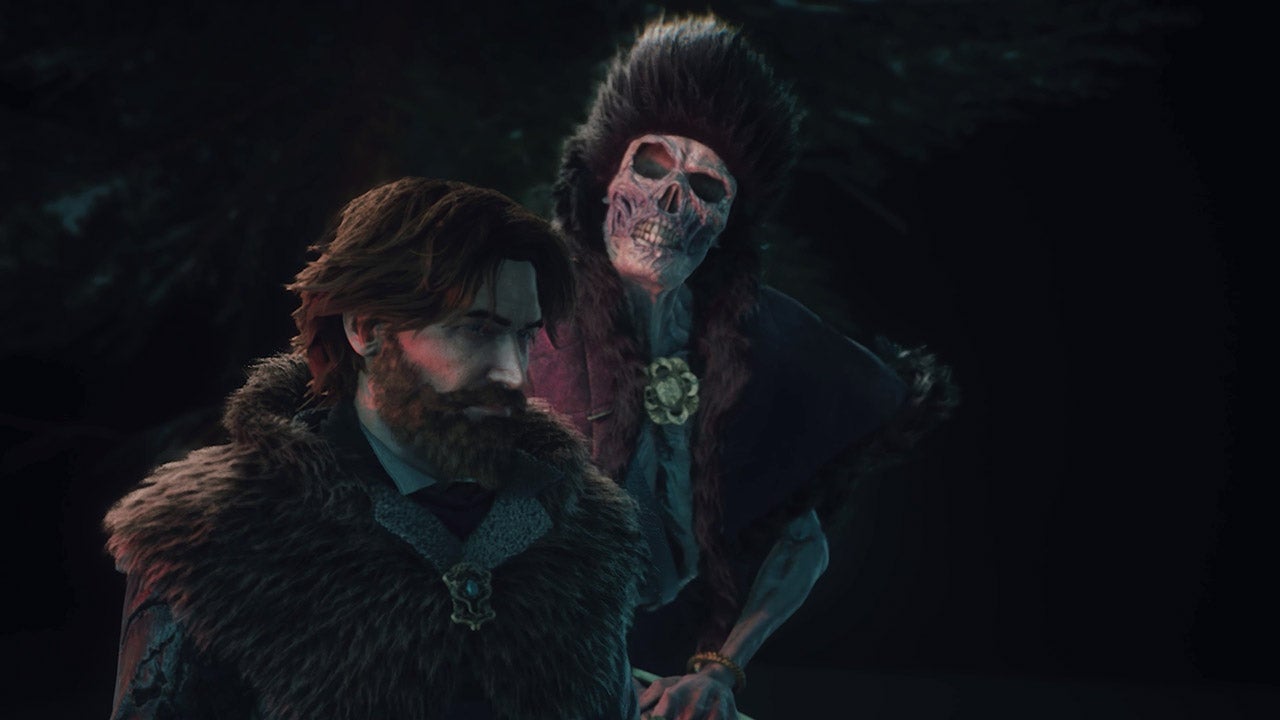
Wictor and his salutor.
Salutors are where most of Wictor’s abilities come from. These creatures (demons invisible to everyone except Wictor and other thaumaturges) attach themselves to people in the form of “Flaws.” However, only thaumaturges can control them. Wictor’s Flaw is Pride, which is what his starting salutor represents. As you progress through the game, you get to steal other people’s Flaws along with their salutors. The more salutors you collect, the more abilities Wictor can unlock.
You can unlock abilities across four skill trees, labelled as “Heart,” “Mind,” “Deed” and “Word.” These skill trees are tiered. The first tier of abilities you can unlock without any restrictions (provided you have enough skill points). After that, you need to add a salutor that would fit under that skill tree to unlock the next tier. For instance, Wictor’s starting salutor is tied to his “Heart” abilities, meaning that the second tier of this tree is unlocked from the start. Once you go through the second tier, you can unlock a third tier by picking up another salutor for that skill tree. This means you can collect eight salutors in total over the course of the game.
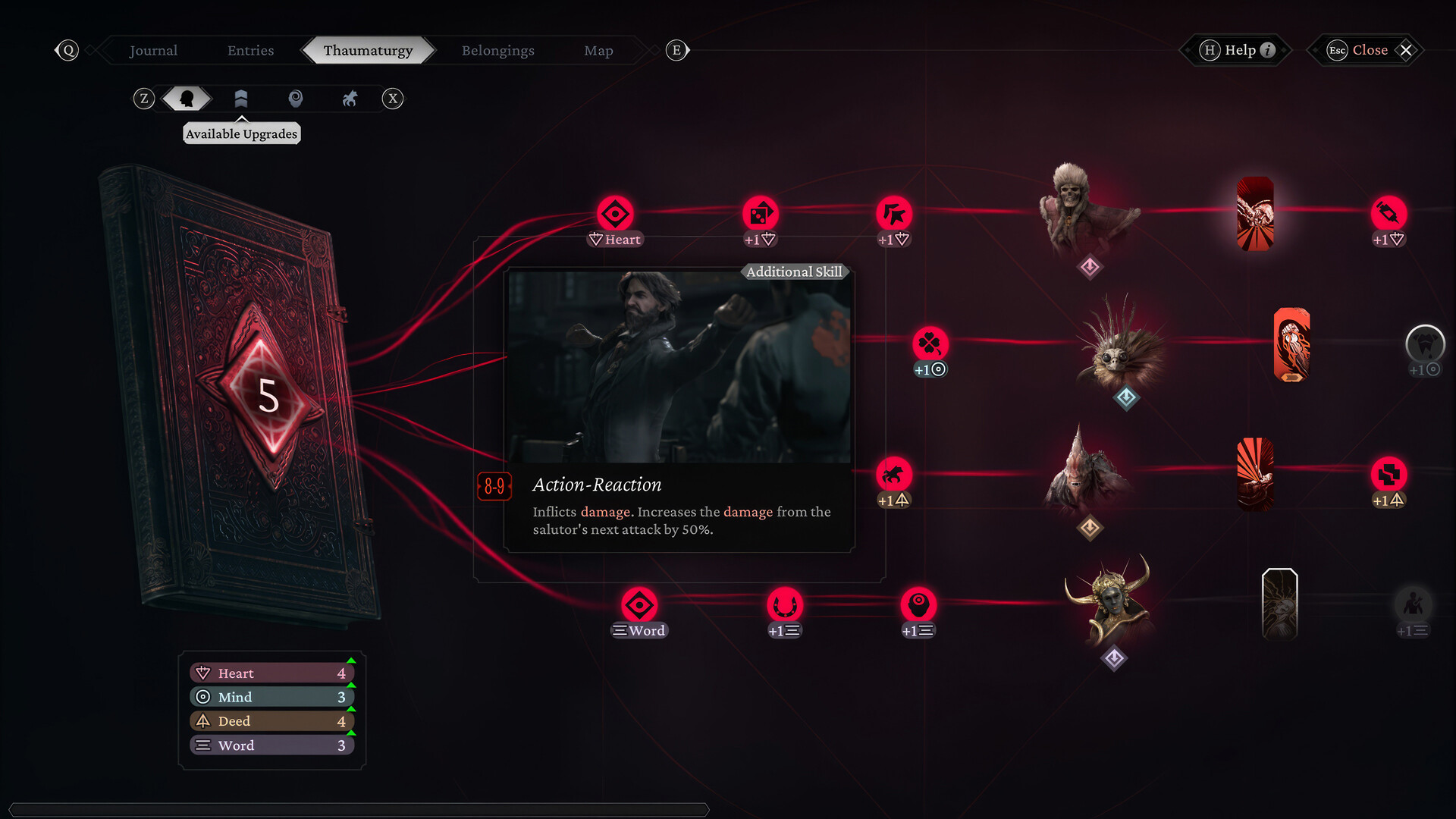
Wictor’s abilities.
To acquire a salutor, you need to confront one in battle – but before you do that, you need to find the person the salutor has attached themselves to, to lure them out. This is accomplished through a series of investigations, which make up the bulk of the game. Investigations involve you doing two things – collecting and examining items and talking to NPCs. Your ability levels determine what dialogue options are available to you and what items you can examine. For example, if examining character X’s diary requires level 5 under the “Heart” skill tree, then you won’t be able to obtain the necessary evidence from that item unless you level up.
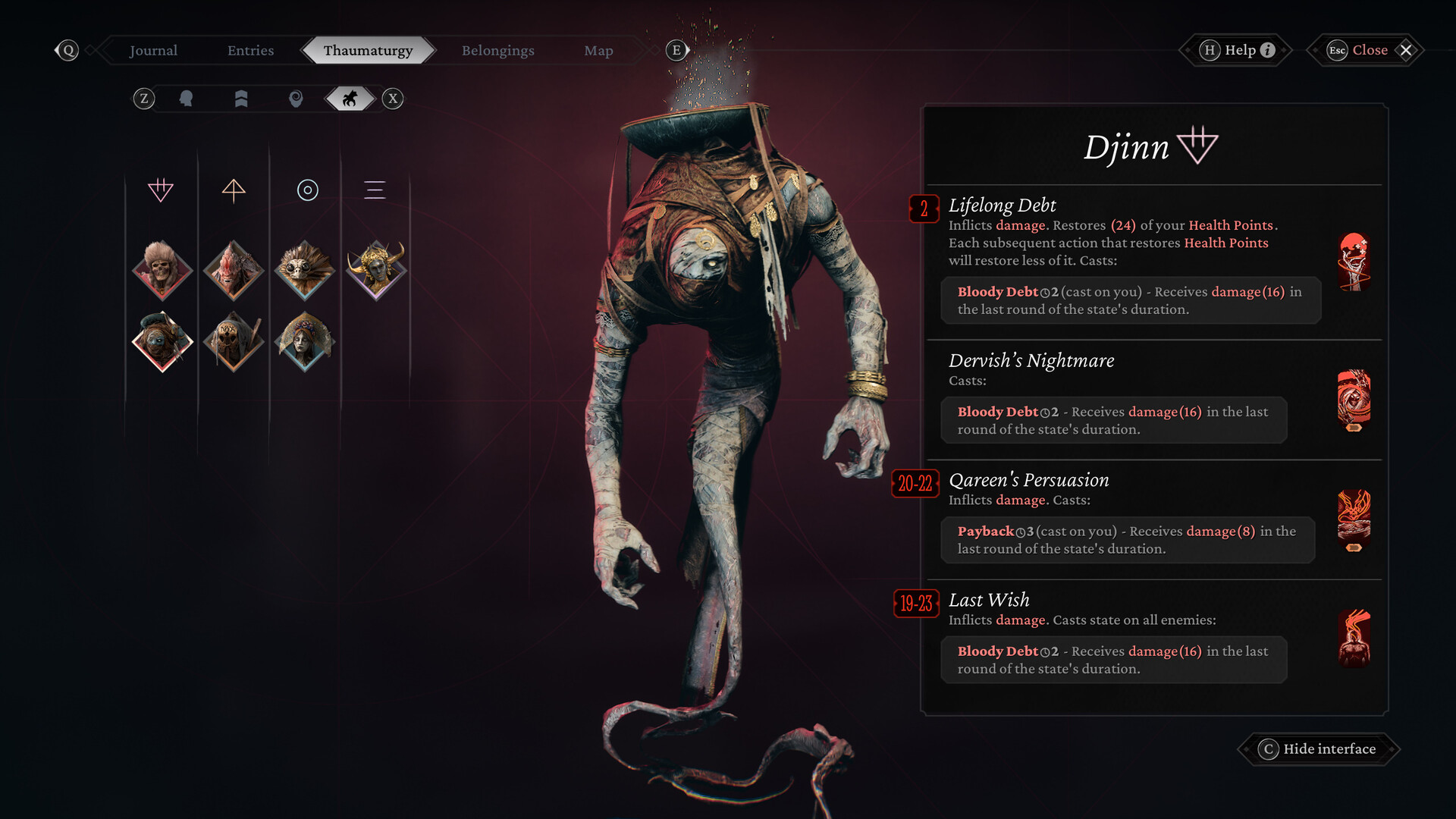
Your salutors.
Examining items unlocks new dialogue options with the characters tied to the investigation. For instance, if you learn that character X knows another character relevant to the investigation, an option to bring this up will appear when you speak to character X again. Your abilities can also influence characters at certain points. Again, this is dependent on the level achieved within the appropriate skill tree. Influencing characters can usually lead to them either doing something for you or revealing key information.
The game can be pretty hand-holdy, however. All Wictor needs to do is snap his fingers and a red arrow will show you where to go next. It won’t always highlight a specific item or character, but it will always lead you to the relevant investigation area. Once in there, Wictor can snap his fingers again to reveal which specific items or characters you can interact with (you do need to be close by for them to be highlighted).
It can be an uninvolved process at times, but that doesn’t mean that you’ll get to solve every investigation perfectly, since plenty of items and dialogue options are missable. Same goes for salutors and entire quest chains. Missing certain quests can have a direct impact on the story and ending. Missing a salutor cuts off your progression in the applicable skill tree. So, there are consequences to “auto-piloting” through the game, but honestly, it only takes a modicum of involvement to not miss these things.
When not investigating things or talking to people, you get to engage in the game’s combat. This can feel a little shallow and easy, especially early on. The fights are turn-based and usually involve human enemies. Wictor gets an equivalent of light and heavy attacks, plus several other actions, which you can modify to produce additional effects as you level up (e.g. heal you, deal more damage, etc.). Light attacks deal less damage but happen almost instantly, while heavy attacks deal more damage, but take longer to activate, leaving you open to attacks from your opponents.
There’s no movement during battles – your character remains stationary, similarly to how it works in classic JRPGs (think PS1 era). Salutors can also be used in battle. Usually you pick a salutor, then have them perform a specific attack. Some attacks come with additional effects, such as healing or transferring negative status effects from you onto the enemy. Yes, enemies can inflict negative status effects on you, such as “bleeding,” which chips away at your health after each turn. Finding the right time to heal or remove negative status effects is where the strategic aspect of the combat system comes in.
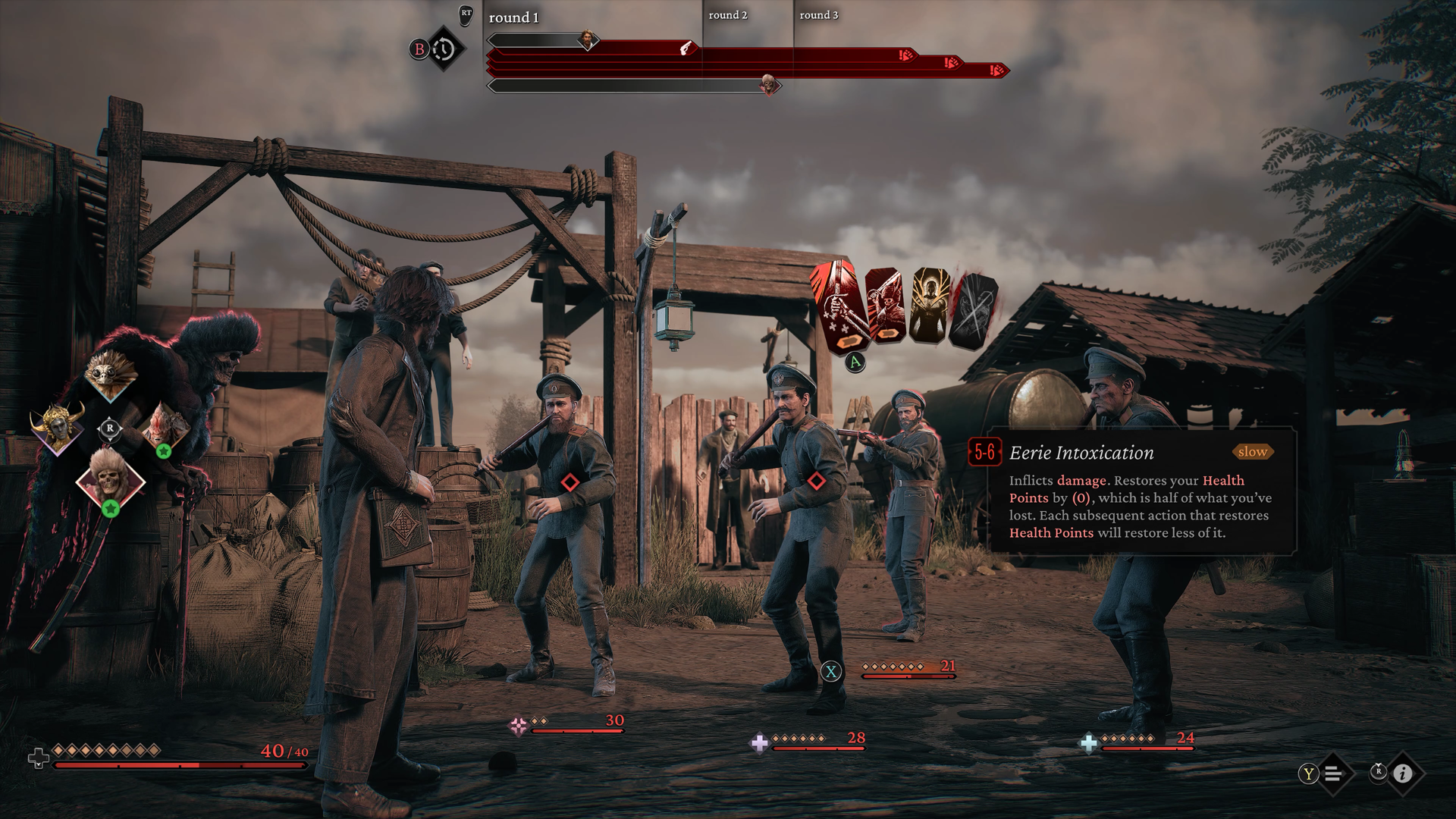
The Thaumaturge’s combat system.
Bosses are made up primarily of salutors. On paper, this is all well and good, but in practice, these “bosses” are just your regular enemies. Basically, the salutor you’re fighting summons a group of human specters, then recedes into the background (quite literally) to watch you fight them – occasionally damaging you with its magic. Kill all the specters and you defeat the salutor. Additional damage and multiple waves of enemies make these fights slightly tougher than the regular ones, but otherwise, they play out the same, making bosses in this game very one-note.
Compared to something like Baldur’s Gate 3, where you have to juggle multiple party members, their placement and the terrain itself, this combat system is almost too simple. Combined with the fact that you only face about two to four enemies at a time, most of whom are a variation of a guy with a sword, a guy with a gun and a guy with fists, and you have a recipe for a pretty repetitive combat system.
This would’ve been okay if fights occurred every now and then, but they can be frequent – almost to a comedic effect. Given that most of the game is set on the streets of Warsaw, it’s funny to have so many cops and thugs assaulting you at every corner. It’s even funnier that Wictor gets to beat them all up, John Wick-style. There’s a dissonance between the setting the game strives to sell you on and overabundance of baddies for you to punch out. Though this is mostly a story problem, it does lead to repetitiveness, given that most encounters are very samey.
The fact that you only have Warsaw to explore also means that most environments will get old long before the game is over.
Story
So, what about the story? You are Wictor Szulski, a lonesome outcast who travels to Warsaw to uncover the circumstances of his father’s mysterious death as well as unlock his full potential as a thaumaturge.
Two key characters come into play – Rasputin, a sorcerer who becomes Wictor’s thaumaturgy mentor, and Ligia, Wictor’s ambitious twin sister who also wants to uncover the mystery behind their father’s death.
The story and characters are what hold this game together. I was intrigued by Rasputin, for instance, who has this sinister aura about him that never fully crosses into outright villainy. He seems to genuinely want to help Wictor, but he does have ulterior motives. Or at least, so it appears. Ligia is the more outspoken and ambitious of the two siblings, and though she is invested in Wictor’s goal, she does not fully approve of his thaumaturgy exploits. As you might’ve guessed, she and Rasputin don’t see eye to eye.
All of this is set against the backdrop of Russia-occupied Warsaw. Russians are portrayed as the ruthless oppressors they were during that time. They treat the Polish (and pretty much anyone who isn’t Russian) as second-class citizens, and are in return, despised by just about everyone. There’s a sense that a revolution is around the corner. Beneath this historically accurate veneer lies a world where sorcerers and demons are real, and weirder yet, whose existence is not disputed by anyone. Wictor, for instance, does not hide the fact that he is a thaumaturge. When he introduces himself as such, no one bats an eyelash. It’s an accepted, legitimate profession in this version of Warsaw.
The blend of history with bonkers fantasy elements instantly made me think of the Assassin’s Creed games (which blend history with wacky sci fi shenanigans). So, while the setting does feel authentic, the game doesn’t strive for complete realism the way, say, Kingdome Come: Deliverance 2 does.
You do get to make choices along the way. Side quests can impact the ending, and your choices will be noted in the inevitable ending slides. Given that Wictor’s flaw is Pride, it influences his dialogue options. Essentially, you have a “normal” response and a “prideful” response. The latter increases your level of Pride. Opting for one over the other repeatedly can eventually lock you out of the lesser used option. This, in turn, will change the outcome of certain scenes as well as how other characters perceive you. It also plays a role in the ending.
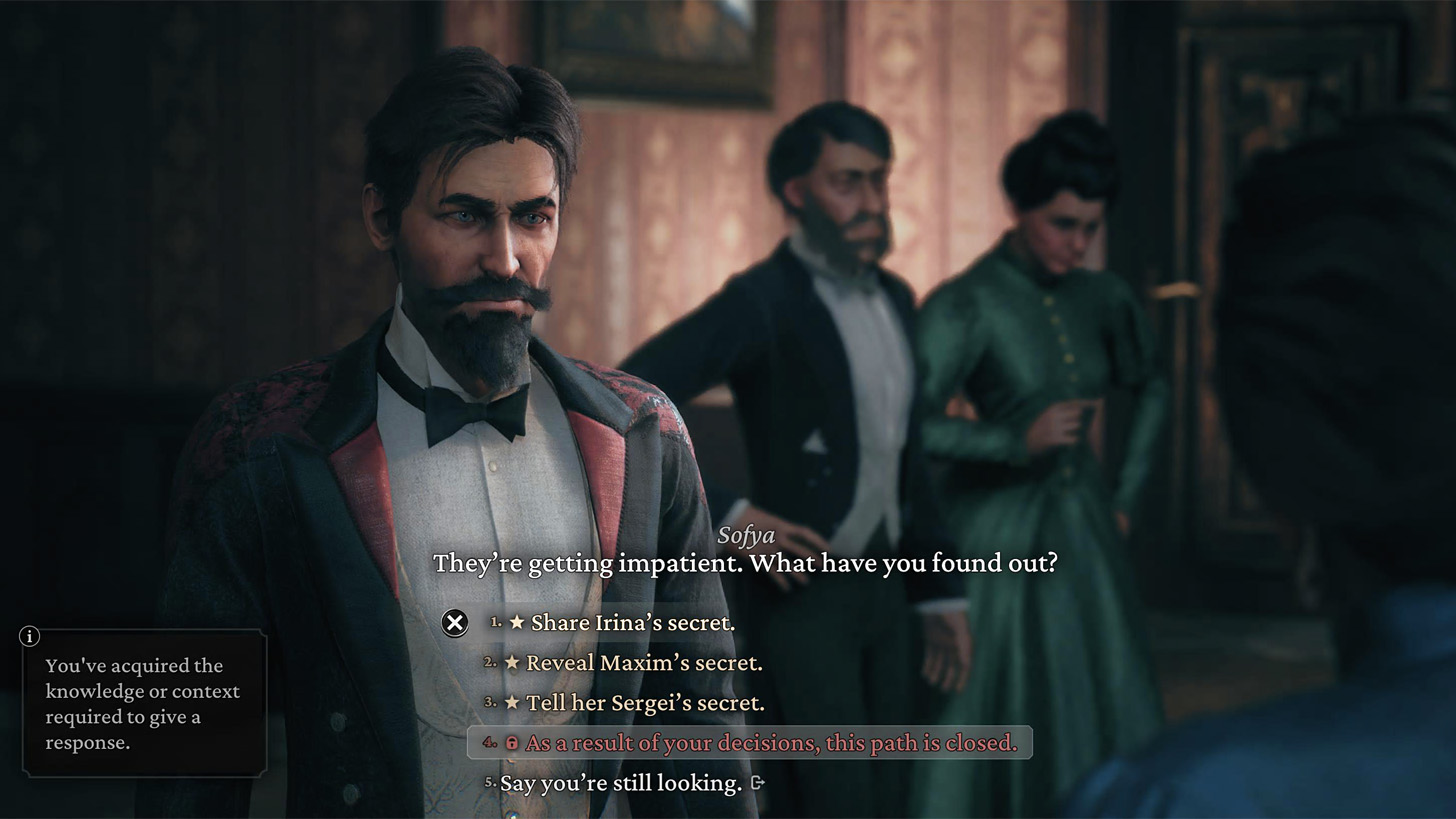
Dialogue options in The Thaumaturge.
Prideful answers tend to lead to more entertaining scenes, similarly to the Renegade options in the Mass Effect games, but they also turn Wictor into a bit of a jerk.
Compared to something like Disco Elysium, which also prioritizes story and dialogue, this system feels too simplistic. You can’t shape Wictor’s personality the same way you can shape your protagonist in Disco Elysium. This leads to the story becoming stale by the end. Furthermore, the writing isn’t nearly as punchy as in Disco, which saps some of the scenes of their impact. It isn’t terrible, mind you, but some of the dialogue can be a bit uninspired, possessing neither humour nor wit.
I found the ending and the climax to be underwhelming too, as it doesn’t live up to the promise set up early on. Rasputin, for instance, is a character that falls flat by the end (especially if you make choices that don’t favour him), and several other characters (such as a certain historical figure) become pivotal at the last minute, making the final scenes unimpactful, given that we hardly know these characters (them being historically famous doesn’t excuse their lack of presence or characterization throughout the game).
Overall, the story is a mixed bag, but it has its moments.
Visuals and sound
On the visual side, the game is gorgeous. Warsaw is rendered in exquisite detail, with citizens, carriages and streetcars all milling about like they would in real life. Though the game employs a fixed camera and an isometric perspective, you’re always treated to nice-looking environments – courtesy of Unreal Engine 5.
When it comes to dialogue and cutscenes, the game goes all in on the cinematic approach. You get your standard reverse-short dialogue scenes as well as more sophisticated scenes, where the camera either pans around a location or depicts an action scene, with nice animations and cinematography. The cutscenes look good – almost AAA-level good.
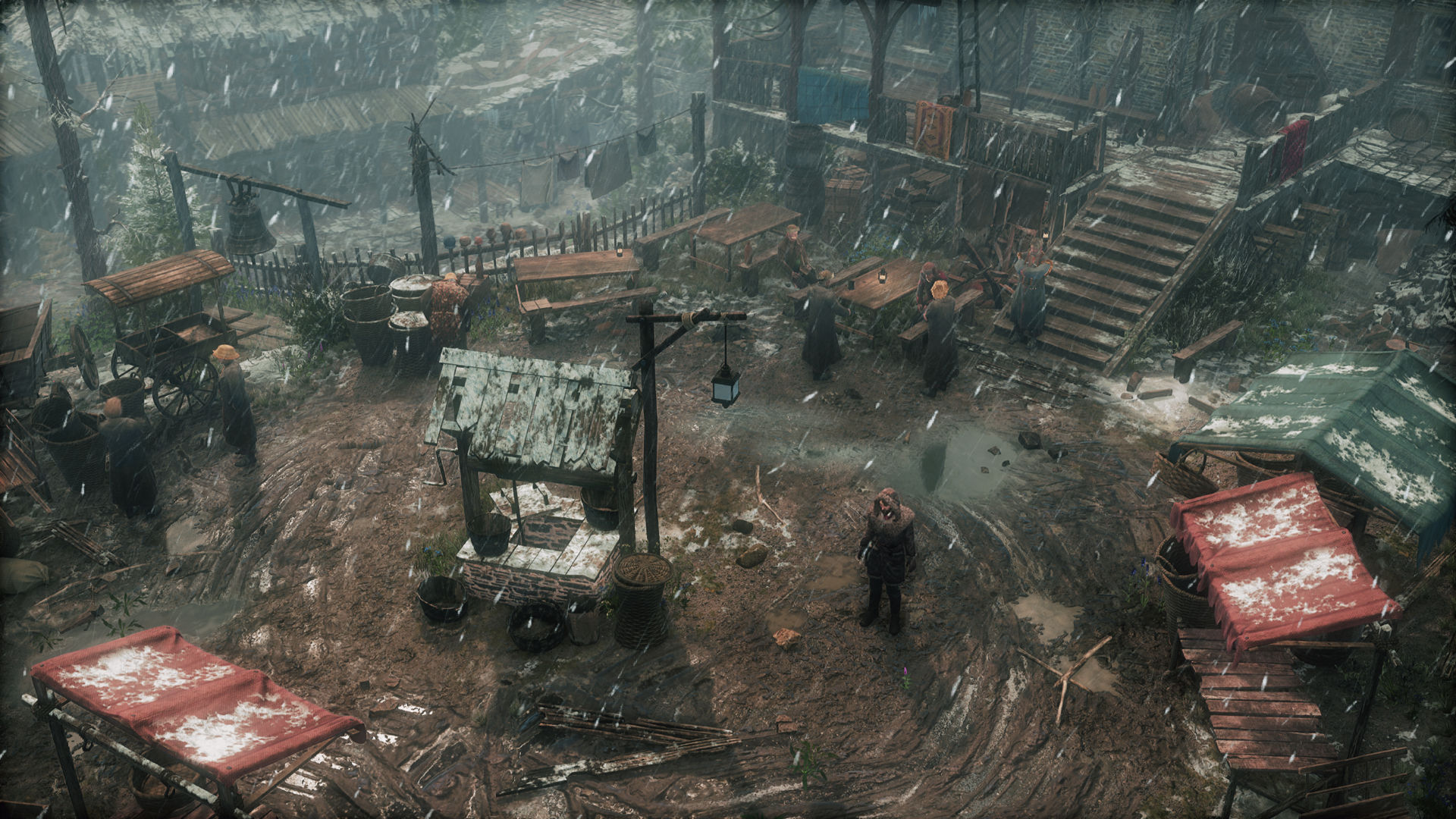
The Thaumaturge’s gorgeous visuals.
Where the visuals falter is in facial and body animations. Characters don’t emote much, and their movements are stilted and repetitive. Baldur’s Gate 3 this is not. That said, if you’ve played Ubisoft’s Star Wars: Outlaws, then you might find these lacklustre character models a little too familiar (seriously – what’s up with Ubisoft’s animation quality lately?). Even so, The Thaumaturge’s presentation is so top-notch in other areas that it’s easy to overlook the stilted character models.
The dialogue in the game is fully voiced, including Wictor himself. The voice acting is decent most of the time, though there are a few awkward moments here and there. However, they don’t detract from the overall experience. The soundtrack is also nice – very era-appropriate and atmospheric. The city is appropriately full of life, with bird chirps, shouts, idle conversations, horse clops and streetcar horns all filling up the air to create an authentic soundscape.
In short, the game looks and sounds great, punching far above its weight as far as I’m concerned.
Conclusion
The Thaumaturge definitely stands out from the crowd, thanks mainly to its unique setting and premise, backed by solid visuals. However, neither the gameplay nor its story can full carry it across the finish line. The game makes a great first impression with its stellar visuals and interesting world, but by about the halfway point, it all becomes a little stale. The story loses some of its momentum and the gameplay gets repetitive. The setting also gets old, since you’ll be revisiting the same few areas for the majority of the game.
It’s frustrating because I was really taken in by then setting and initial story beats, but as it stands, the game is woefully undercooked. It’s combat system is shallow and its story doesn’t come anywhere near the heights of something like Disco Elysium. That said, if you’re intrigued by the setting or anything I’ve talked about here, pick this game up when it’s discounted, and you might have some fun with it.

